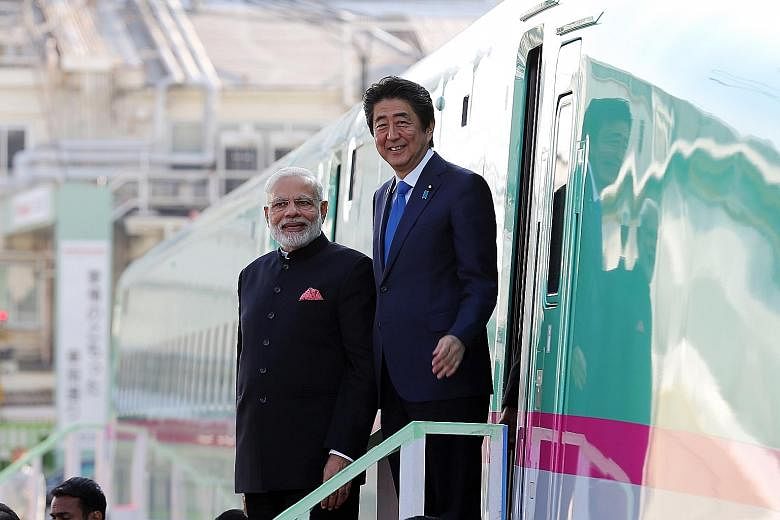NEW DELHI/TOKYO • Japanese steel and engineering companies are in the driver's seat to bag major supply contracts for a US$17 billion (S$22.5 billion) Indian bullet train, several sources said, undermining a key component of Prime Minister Narendra Modi's economic policy - a push to "Make in India".
Japan is funding most of the project and Japanese firms are likely to supply at least 70 per cent of the core components of the rail line, said five sources with direct knowledge of the matter in New Delhi.
The agreement made last September between Japan and India for the bullet train project between the cities of Mumbai and Ahmedabad included two clauses - the promotion of "Make in India" and "Transfer of Technology" - through which New Delhi had hoped to set up manufacturing facilities in the country, generate jobs and gain a toehold in Japanese technology.
Mr Achal Khare, the managing director of National High Speed Rail Corp, the agency tasked to execute the bullet train project, said: "The Japanese have reservations on certain issues because they have a concern that there is a difference in the culture and systems of Japan from the culture and systems in India."
Mr Khare did not elaborate but two Indian railway officials, who spoke on condition of anonymity, said their Japanese counterparts had raised questions about efficiency in Indian companies and their ability to meet timelines.
The World Bank currently ranks India 100 out of 190 nations on ease of doing business, giving it relatively low marks for starting a business, enforcing contracts and dealing with construction permits.
Mr Tomoyuki Nakano, director for International Engineering Affairs in the Railway Bureau at Japan's Transport Ministry, said the issue was that Indian companies had no experience or technologies specialising in high-speed railway systems at present.
"I don't think the Japanese are concerned about a difference in the work culture," Mr Nakano said.
He and other Japanese officials said efforts were continuing to fulfil the "Make in India" component of the agreement by promoting collaborations between companies from the two countries.
Still, several Indian officials said it was by and large accepted that Indian companies would not have a major part to play in the project.
Japan will get major leeway because the bullet train is largely funded by a 50-year loan provided by its government, said a close aide of Mr Modi, who spoke on condition of anonymity.
The sole collaboration aimed at the bullet train project is between Kawasaki Heavy Industries and India's Bharat Heavy Electricals, which aims to win carriage orders.
New Delhi has tried to help Indian steel companies grab a slice of the pie. But the domestic firms have been overlooked by Japanese companies due to quality concerns, sources said.
Left with little choice, Indian firms will now largely provide raw materials, like cement, and supply manpower for the assembly of rails, the sources said.
India's UltraTech Cement, Larsen & Toubro , Bharat Heavy Electricals and Ambuja Cements are among those in the race for the supply of construction materials and power.
Mr Modi's flagship "Make in India" initiative aims to lift the share of manufacturing in India's US$2 trillion economy to 25 per cent from 17 per cent and create 100 million jobs by 2022.
However, midway through Mr Modi's five-year term, manufacturing was still at 17 per cent of India's gross domestic product in the 2016/17 financial year from 15 per cent previously.
Japanese government officials have asked for more bullet train corridors in India before transferring technology, three senior Indian officials said. But New Delhi is unlikely to announce any new projects until the final cost and commercial feasibility of the Mumbai-Ahmedabad link is clear, the officials said.
REUTERS

